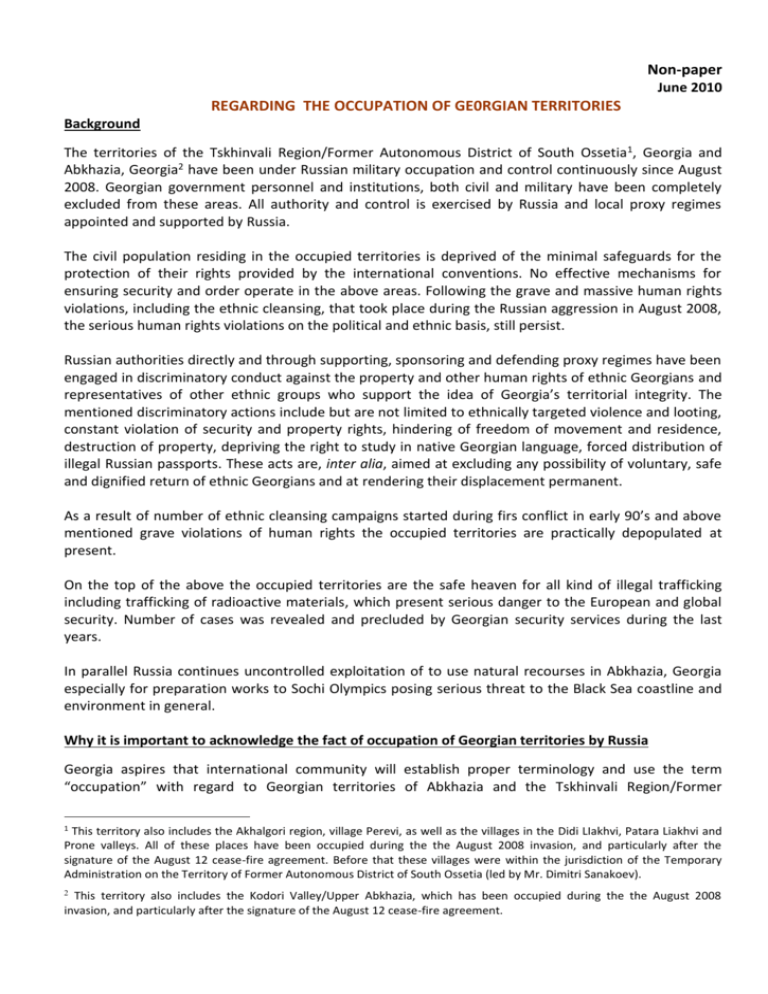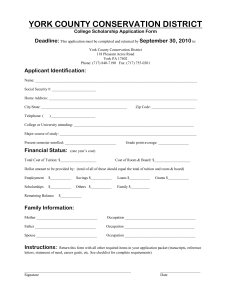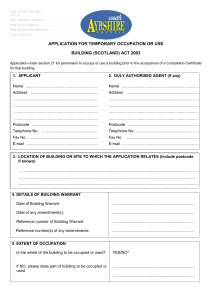Regarding the Occupation of Georgian territories
advertisement

N-nonNon-paper June 2010 REGARDING THE OCCUPATION OF GE0RGIAN TERRITORIES Background The territories of the Tskhinvali Region/Former Autonomous District of South Ossetia1, Georgia and Abkhazia, Georgia2 have been under Russian military occupation and control continuously since August 2008. Georgian government personnel and institutions, both civil and military have been completely excluded from these areas. All authority and control is exercised by Russia and local proxy regimes appointed and supported by Russia. The civil population residing in the occupied territories is deprived of the minimal safeguards for the protection of their rights provided by the international conventions. No effective mechanisms for ensuring security and order operate in the above areas. Following the grave and massive human rights violations, including the ethnic cleansing, that took place during the Russian aggression in August 2008, the serious human rights violations on the political and ethnic basis, still persist. Russian authorities directly and through supporting, sponsoring and defending proxy regimes have been engaged in discriminatory conduct against the property and other human rights of ethnic Georgians and representatives of other ethnic groups who support the idea of Georgia’s territorial integrity. The mentioned discriminatory actions include but are not limited to ethnically targeted violence and looting, constant violation of security and property rights, hindering of freedom of movement and residence, destruction of property, depriving the right to study in native Georgian language, forced distribution of illegal Russian passports. These acts are, inter alia, aimed at excluding any possibility of voluntary, safe and dignified return of ethnic Georgians and at rendering their displacement permanent. As a result of number of ethnic cleansing campaigns started during firs conflict in early 90’s and above mentioned grave violations of human rights the occupied territories are practically depopulated at present. On the top of the above the occupied territories are the safe heaven for all kind of illegal trafficking including trafficking of radioactive materials, which present serious danger to the European and global security. Number of cases was revealed and precluded by Georgian security services during the last years. In parallel Russia continues uncontrolled exploitation of to use natural recourses in Abkhazia, Georgia especially for preparation works to Sochi Olympics posing serious threat to the Black Sea coastline and environment in general. Why it is important to acknowledge the fact of occupation of Georgian territories by Russia Georgia aspires that international community will establish proper terminology and use the term “occupation” with regard to Georgian territories of Abkhazia and the Tskhinvali Region/Former 1 This territory also includes the Akhalgori region, village Perevi, as well as the villages in the Didi LIakhvi, Patara Liakhvi and Prone valleys. All of these places have been occupied during the the August 2008 invasion, and particularly after the signature of the August 12 cease-fire agreement. Before that these villages were within the jurisdiction of the Temporary Administration on the Territory of Former Autonomous District of South Ossetia (led by Mr. Dimitri Sanakoev). 2 This territory also includes the Kodori Valley/Upper Abkhazia, which has been occupied during the the August 2008 invasion, and particularly after the signature of the August 12 cease-fire agreement. Autonomous District of South Ossetia. Illegal military presence and the effective control exercised over these regions makes Russia an occupying power. It is also important that the international community begins to use the term “ethnic cleansing” regarding developments during and after the August 2008 War. The acknowledgement of the fact of occupation and ethnic cleansing gives to the EU and all International society the legal right to make Russia responsible for the human right protection and safe and dignified return of IDPs to the territories of Georgia currently occupied by Russia, as well as for preventing nuclear proliferation and protecting environment on these territories. Legal aspects of occupation Customary definition of the occupation stems from article 42 of the Hague Regulations - “territory is occupied when it falls under effective authority of the enemy territory”. - International humanitarian law (IHL) follows very practical approach as it refers to the factual control of the territory without formal declaration of the invading force. - Thus, the occupation starts when the foreign military force has made the incursion on the territory of the other state and it exercises any form of control over the territory. - In addition, the longer the occupation lasts, the more detailed the obligations become. Following the incursion of the Russian Armed Forces into the territory of Georgia (Abkhazia and Tskhinvali Region/Former Autonomous District of South Ossetia) during Russian-Georgian War, those territories have become occupied as soon as they fell under actual control of the Russian Forces. In particular: - Territories of Abkhazia and Tskhinvali Region/Former Autonomous District of South Ossetia represent Georgian sovereign territories and as such they fell under military control of the enemy force (Russian Federation); - While in case of South Ossetian and Russian armed forces had active military hostilities, Georgia was unable to resist Russian Forces in Abkhazia in a similar matter; however, this fact does not make any change in the application of the occupation regime; as noted above occupation can take place even without active resistance of the state concerned; - Russian armed forces continue to be present on Georgian soil without the consent of the Georgian central authorities - supreme sovereign within the state, thus they continue to be an occupying power; Recognition of the independence of the Georgian regions – Abkhazia and Tskhinvali Region/South Ossetia by Russia has been unanimously declared by all international organizations as a violation of international law and the “6-point cease-fire agreement” of August 12, 2008. Based on above, Russia’s appeal on the Independence of the Georgian regions – Abkhazia and Tskhinvali Region/South Ossetia and ,,bilateral” agreements with these ,,independent states” to justify its presence on the occupied territories is fully illegal according to the International law. Consequently, Russia’s further presence and its status on these territories might only be considered as an occupation according to the Geneva Convention IV (GC IV). What are the obligations of the Occupying Power 2 The occupying power is the temporary administrator of the territory for the time the occupation lasts; therefore, it has the obligation to preserve public order, safety and welfare on the occupied territory from the very beginning (Article 43 of the Hague Regulations of 1907 and Article 64 of the GC IV). Thus, occupying power is not only obliged by law to act diligently but take all necessary measures in order to secure safety of the local population. Among other, occupying power has a legal duty to: - Respect civilian persons’ honor, their family rights, their religions and practices (Article 27 of the GC IV); - Facilitate the relief schemes (Article 59 of the GC IV); - Protect civilian population from any arbitrary action. The LoC explicitly defines instances when and which circumstances the civilian may be detained as well as which procedural safeguards civilian person shall be granted (Article 78 of the GC IV); - Protect civilian population individual or mass forcible transfers, as well as from deportation (Article 49 of the GC IV); - Respect Private property as it may not be destroyed (Article 53 of the GC IV); In addition, the Occupying Power is forbidden from: - Discrimination, torture or other forms of physical violence and hostage taking against civilian population (Articles 32 and 34 of GC IV); - Pillaging and imposition of the collective punishment (Article 33 of the GC IV); Following the occupation of the Georgian territories by the Russian Armed Forces - Ethnic Georgian civilian population residing in the said territories had been subject to discrimination and massive deportation amounting to ethnic cleansing; - On several instances Georgian civilians were arbitrarily detained and/or subject to torture, illtreatment, rape and physical abuse; - Property of ethnic Georgians has been destroyed - firstly looted and then burned down; These IHL violations were carried out either by the members of the Russian Armed Forces or through their tacit consent by the militia of Abkhazian and South Ossetian proxy regimes. Russian Federation has taken neither criminal nor disciplinary sanctions/measures against perpetrators. Despite continuous efforts of international and regional organizations reminding Russian Federation of its obligations, it continues to commit those violations on permanent basis. Conclusions According to the international law Russia’s illegal military presence and effective control exercised over Georgian territories means occupation of these territories. The acknowledgement of this fact and proper assessment of the situation on the ground, particularly its legal aspects; and relevant reflection of existing realities in the policies of the EU, the Member States, other nations and international organizations will greatly support the identification of efficient ways for resolution of the Russia-Georgia conflict, as well as for making Russia responsible for human-right situation, prevention of nuclear proliferation and protection of environment on the occupied territories. 3







